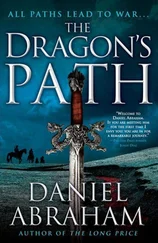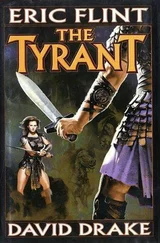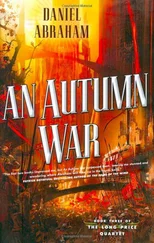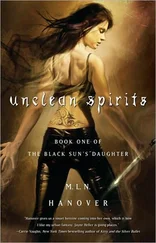Enen opened the door. A Timzinae man she didn’t know was at the woman’s side. He wore the rough cotton of a dockworker.
“Someone asking to see you,” Enen said, her voice soft and gentle in a way that told Cithrin of the fear that had brought this man, whoever he was, to her. Cithrin willed herself to sit up a little straighter. There was room enough in the chair for her and Geder’s lover; there would be enough for Magistra Cithrin bel Sarcour too.
“Come in,” she said.
The man stepped in. His nictitating membranes were clicking open and closed and he held his hands in fists tight against his sides.
“I’m sorry for bothering you,” he said. “Only I heard about you from Kitap, and I thought … I thought …”
“Kitap?” Cithrin said, and the man’s face fell. Then, “You mean Master Kit?”
“Yes. You might have called him that. He used to live with my family, back before he was anything in particular. My name’s Epetchi. Maybe he talked about me? Or Ela?”
“He may have,” Cithrin said. “Now that I think of it, he may have.” She didn’t remember him saying a thing, but she knew from someone that there had been a café run by friends of his down near the docks.
“He said you might be able to help people. That you were a good person. A friend.”
Cithrin smiled the way she did in any negotiation and nodded toward the divan.
“Tell me what’s going on, Epetchi,” she said.
His niece had been one of the children taken from the prison, only she’d been hurt in the flight. He was hiding her in his storeroom, but she had a fever and it was getting worse. He didn’t dare go for a cunning man for fear that they’d be turned in to the Anteans. As he explained himself, the high whine of anxiety faded from his voice and a deeper, lower kind of fear came in. One more like despair.
Cithirin listened carefully. The fumes of the wine faded quickly, and her mind danced over the problem. Epetchi was right, of course. The protector’s guard would be watching the cunning men. The priest would be questioning them and anyone else whose work it was to give aid to the desperate and in need. When he shrugged and went silent, she pressed her fingertips to her lips and thought.
“Come with me,” she said. He followed her out to the guard room. Yardem and Enen were both there.
“Yardem, do you know of any cunning men willing to die because I put them on a list?”
“Know one I could ask.”
“Do that,” Cithrin said. “Then get him to this man’s café. He’s a friend of Kit’s.”
“My sympathies,” Yardem said seriously, and then broke into a grin. Epetchi laughed.
“You know him too, then?”
Cithrin stepped back. Yardem would see to it now. She walked through the corridors, back to the kitchen for two more bottles, and then to her room. She’d done enough of her business for the day, and if she went there, she would only read the letter again. She didn’t want to do that.
The plant that Isadau had given her that first day still sat on her sill. Its small, thick needles hadn’t gone brown with the autumn. Cithrin sat on her bed and watched it quiver in the breeze. Another good night, then. Maybe another life saved. She wondered who had engineered the escape of the prisoners. It was reassuring to know that there were others in the city who were taking action, but it was not surprising. This was their home. These were their children. If the whip ever came to their hand, Geder’s soldiers would suffer and die, she didn’t have any doubt.
She wondered how much was enough. She had already managed an order of magnitude more than Isadau could have. She had immunity for the bank that no one else in the world could have acquired, and she’d used it as best she could. But she couldn’t say it was enough. Her own argument circled back. One more day would save another few people, and how could she tell herself that the ones she would have saved were less important than the ones she already had? And one more day after that, and after that, and after that until Geder came to her door expecting a lover to fall into his arms.
And then? What were the lives worth that she could still save after that? If she fell as she was expected to, if she became the woman the letters were for, how many more refugees could she spirit out of Suddapal?
It was an exchange, just as anything was. She could maintain her branch and its immunity. She could get information about the Antean army and the spider cult. And all it would mean was becoming Geder Palliako’s lover. She tried to imagine what it would be like, standing naked before him now that she knew he’d ordered the death of Vanai, now that she’d watched him slaughter a man, now that she’d lived in a city that had been broken by his will and the will of his priests. Unpleasant, yes, but her body was only a body. Access to it was something he wanted and that she was in a position to give. And what she would gain from it couldn’t be had for any other price. This wasn’t a new equation. She’d had the same essential decision with Sandr and with Qahuar Em. Once, it hadn’t been a good trade. Once, she’d thought it was and had been wrong. Neither of those had killed her heart.
The plant shivered. Cithrin pulled the cork from her bottle and sat with her back to the cool, rough wall. The taste of grapes and the bite of the alcohol were like old friends come to commiserate. Isadau would have died for her city, and Cithrin had bought her absence with a promise. A promise to save as much of Suddapal as she could. So in a sense, if she took up with Geder Palliako again, if she sat at his table and laughed at his jokes and permitted herself to be used by him in his bed, it would still be from love. Her love for Isadau. She drank from her bottle. She knew from long experience it would take at least one more for her to sleep tonight.
“Fine,” she said.
Marcus
The north coast of Hallskar in the depths of winter was a cold kind of hell. Marcus had known from stories he’d heard told by other mercenaries and wanderers that the storms could be vicious and sudden, that the land was harsh and unforgiving. He’d lived in Northcoast most of his boyhood, and the little cruelties of winter were nothing new to him.
He had underestimated.
“We’re all going to die!” Sandr wailed.
“Die walking, then,” Marcus shouted and leaned harder into the storm. Before them, the cart swayed in the wind. A layer of ice was forming on the left side, and Hornet had given up trying to break it off. The horses’ heads were low, their manes glazed as they pushed on. Marcus was more worried about them than about Sandr. If the actor collapsed, they could load him in with the costumes and the props. If the horses fell, they would have to stop. And if they stopped, the chances were good they wouldn’t start again.
The morning had been clear and cold enough to freeze piss when it hit the ground. The sky had given no particular sign of trouble until trouble descended. In the space of an hour, the day went from calm to blustery and from blustery to a howling gale. Dar Cinlama and the Antean expedition had been rumored to be just ahead of them somewhere along this road, but Marcus didn’t care about them any longer. Or about the spider goddess or anything other than the thought that freezing to death on a icy track in Hallskar wasn’t the way he’d hoped to die, but it also wasn’t the worst.
“Your turn,” someone said, but Marcus wasn’t sure who. He tried to blink but his eyes felt raw. Cary tugged at his shoulder again, pushing him toward the cart. “It’s your turn. Get in.”
“Right,” Marcus said. With numb blocks for arms and legs, he clambered up the back of the cart. The wind wasn’t so bad here, though the cold was cutting. There was frost on the costumes. He inched forward until he was nearly at the front. Kit sat on the bench, his body made nearly round by the cloaks, jackets, and blankets that wrapped him. Snow and ice were sticking to him like he was a stone.
Читать дальше










